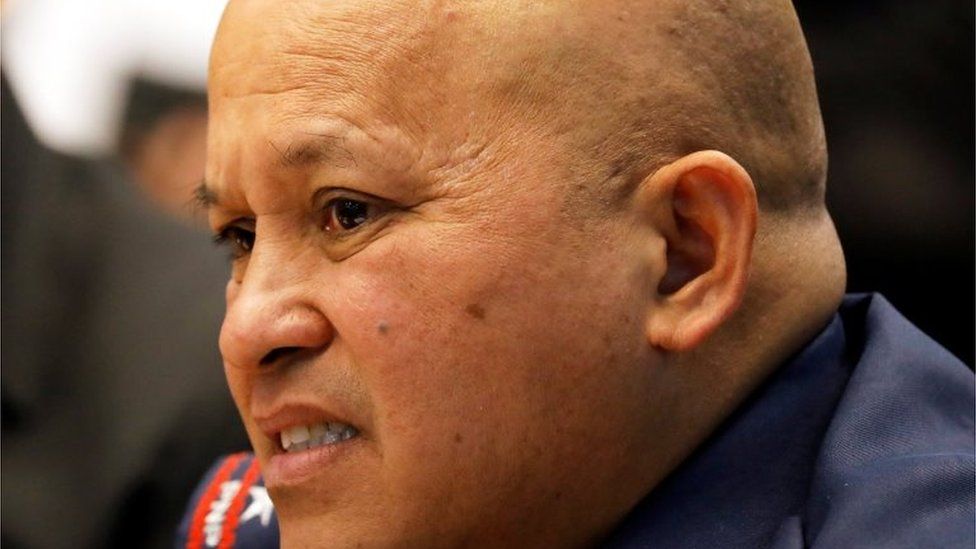Philippines to suspend drug war to clean up 'corrupt' police
- Published

Philippine police are suspending their controversial war on drugs until after the "corrupt" police force has been "cleansed".
Police Chief Ronald dela Rosa said on Monday that anti-drug units would be dissolved.
It comes after the murder of a South Korean businessman inside police headquarters. He had been kidnapped and killed by anti-drug police.
More than 7,000 people have been killed since the crackdown on drugs began.
The death toll and President Rodrigo Duterte's hardline stance against drugs have attracted intense criticism from human rights groups and Western countries, although the president continues to enjoy a high level of support among Filipinos.
Speaking on Monday, Mr Dela Rosa said Mr Duterte "told us to clean the organisation first".
"We will cleanse our ranks... then maybe after that, we can resume our war on drugs."
Raffy Lerma is a photo-journalist documenting the nightly killings
Mr Duterte has made tackling drug use in the Philippines a central part of his presidency.
He had initially promised to eradicate the problem by December, then extended the deadline to March this year.
But he told reporters at a press conference late on Sunday: "I will extend it to the last day of my term... March no longer applies." Mr Duterte's term ends in 2022.
He said he had underestimated the depth of the drug problem.
Jonathan Head, South East Asia correspondent, BBC News: Police too tainted
For eight months President Duterte has been unrepentant as the death toll from his drug war has risen. He has repeatedly promised to support, even pardon, any police officers accused of unlawful killing, and been unmoved even by the clear evidence of police involvement in the drug trade, and the murder of important drug suspects in police custody.
But the shocking murder of South Korean businessman Jee Ick-joo last October has forced Mr Duterte to acknowledge that the Philippines National Police are too tainted to continue running the anti-drugs campaign.
Mr Duterte now accuses the police force of being "corrupt to the core". He has ordered all tainted officers to be sent to front-line duty in the conflict-wracked southern Philippines.
Even if this happens, though, it will not necessarily bring the drug killings to an end. More than 4,000 of the deaths are blamed on unidentified hit squads, although many of those are believed to be run by the police. And the president's promise to extend the anti-drug campaign to the end of his term of office suggests he may try to revive it once the fuss about the murdered South Korean dies down.
Senator Leila De Lima, Mr Duterte's most vocal critic, said the president and the police chief "should categorically give the order to end the killings".
She said the dismantling of the police anti-narcotics operation meant "they are aware that the very men involved in anti-drug operations... are involved in illegal activities under the guise of the so-called war on drugs," she told ANC television.
- Leila de Lima: The woman who dares to defy Duterte
'Corrupt to the core'
Mr Duterte also railed against the police force on Sunday and vowed to "cleanse" it, in response to the killing of Jee Ick-joo.
Jee Ick-joo was seized from his home in Angeles city, near Manila, under the pretence of a drug raid, the Department of Justice said. After strangling him, his killers pretended he was still alive in order to collect a ransom from his family.
"You policemen are the most corrupt. You are corrupt to the core. It's in your system," Mr Duterte said, adding that he thought up to 40% of policemen were used to corruption.
Mr Duterte had sanctioned extra-judicial killings previously, saying he would pardon policemen who kill criminals and civilians in the line of duty.
"When I said I'll protect the police, I'll protect the police. But I won't protect lying," he said.